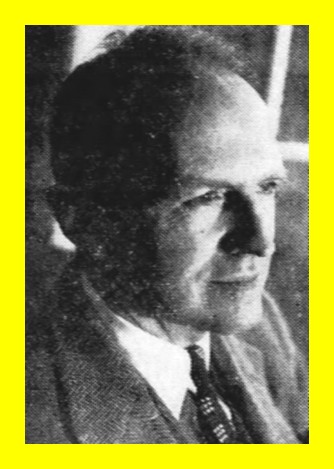A portrait photograph of novelist Conrad Richter of Pine Grove, Schuylkill County, Pennsylvania. The photo appeared in a news story entitled “Pulitzer Prize to Pine Grove Novelist for The Town,” in the West Schuylkill Press & Pine Grove Herald, Tremont, May 11, 1951.
__________________________________
Conrad Richter, distinguished American novelist and one of Pine Grove‘s foremost citizens, received a singular honor this week when it was announced that his book The Town had been awarded the 1951 Pulitzer Prize as the best novel by an American.
The announcement was made late Monday by the Board of Trustees of Columbia University in New York City and marked the 34th annual selection of Pulitzer prizes in journalism, letters and music. Provisions for the awards were set up in the will of the late Joseph Pulitzer and have been administered by Columbia University since that time.
News of the award reached Mr. Richter only a short time after he and Mrs. Richter had arrived in New York City to visit their daughter Miss Harvena Richter who is living there.
The book, his eighth, was published on April 24, 1950.
In The Town, as in his other books, Mr. Richter has dealt with historical events, but in this case, it was his longest effort to date.
In the novel, Sayward, eldest daughter of Worth and Jary Luckett, completes her mission and lives to see the transition of her family and friends from the ways of the wilderness to the ways of civilization.
It is the story of an American family, born in the wilderness grown to face the changing ways of America during the first half of the 19th century.
In The Trees, an earlier novel, the story of Worth and Jary is begun, and it shows how the family pushed west as the frontier advanced to threaten their isolation.
As is evidenced by this week’s award, The Town is a much bigger book and marks a great literary event.
Conrad Richter was born in 1890 in Pine Grove, which was named in part by his great-grandfather, a local squire, store and tavern keeper and major in the War of 1812. One of his ancestors fought with Washington and another was a Hessian mercenary in the British Army.
His father was a preacher and the boy came to live in many different parts of Pennsylvania, mostly in small towns, where he was brought in contact with numbers of typically American families.
Richter’s education was limited to two years at preparatory school and the time needed to finish high school. At 15 he started work driving a light wagon over the mountains of Schuylkill County. There followed jobs in a machine shop, a coal breaker, a small town bank, on a farm, in his own timber business, as a country correspondent for Philadelphia dailies, and eventually reporting on Johnstown and Pittsburgh papers. at 19 he was editor of a weekly paper, and later he became a private secretary in Ohio. He returned to become a publisher and started to write in earnest.
A tireless research worker, Mr. Richter is extremely interested in early American life and spends much time prior to actual writing searching out old diaries, account books, and newspapers, and spending hours talking to old-timers who can supply details heard from their forebearers.
His novels include: Early Americana, 1936; The Sea of Grass, 1937; The Trees, 1940; Tracey Cromwell, 1942; The Free Man, 1943; The Fields, 1946; Always Young and Fair, 1947; and The Town, 1950. The Trees, The Fields, and The Town are a trilogy, although each book is considered complete in itself.
______________________________________
From the West Schuylkill Press & Pine Grove Herald, Tremont, May 11, 1951, via Newspapers.com.
Corrections and additional information should be added as comments to this post.
